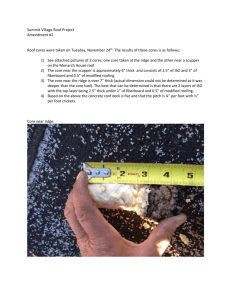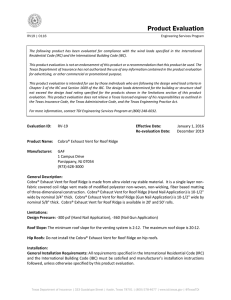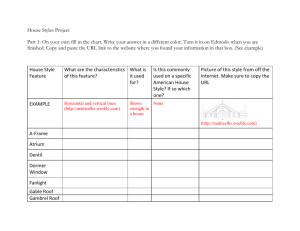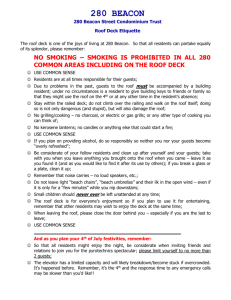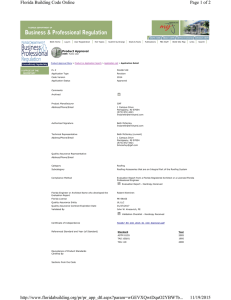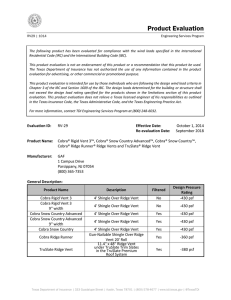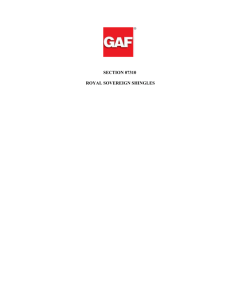PRODUCT EVALUATION Effective {date}
advertisement
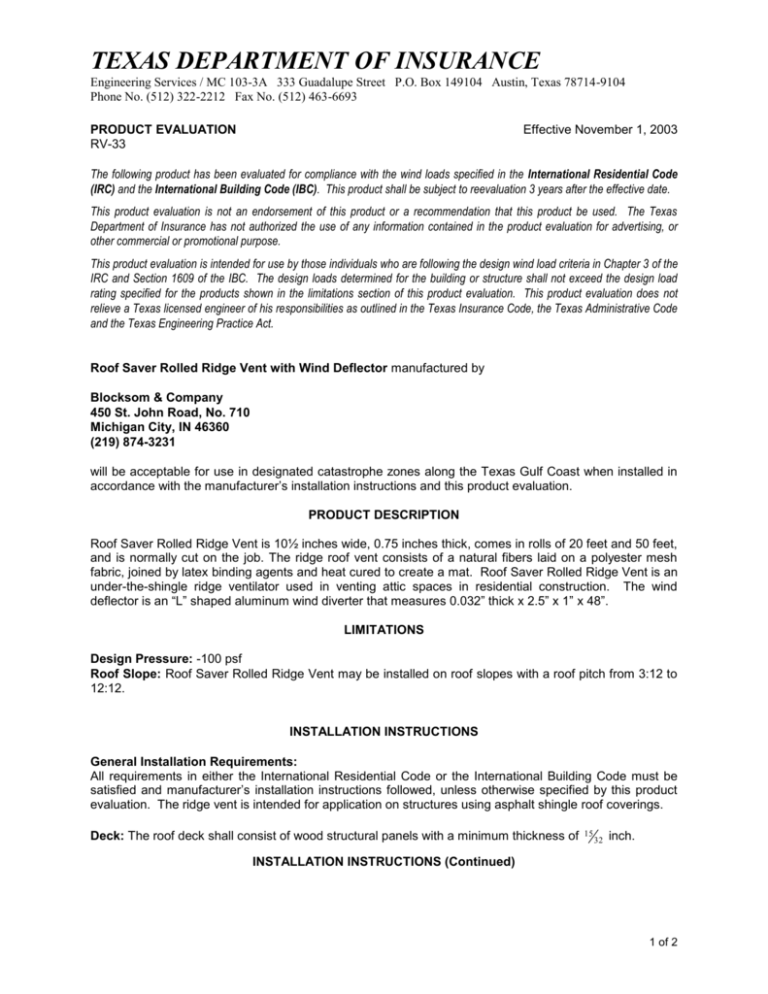
TEXAS DEPARTMENT OF INSURANCE Engineering Services / MC 103-3A 333 Guadalupe Street P.O. Box 149104 Austin, Texas 78714-9104 Phone No. (512) 322-2212 Fax No. (512) 463-6693 PRODUCT EVALUATION RV-33 Effective November 1, 2003 The following product has been evaluated for compliance with the wind loads specified in the International Residential Code (IRC) and the International Building Code (IBC). This product shall be subject to reevaluation 3 years after the effective date. This product evaluation is not an endorsement of this product or a recommendation that this product be used. The Texas Department of Insurance has not authorized the use of any information contained in the product evaluation for advertising, or other commercial or promotional purpose. This product evaluation is intended for use by those individuals who are following the design wind load criteria in Chapter 3 of the IRC and Section 1609 of the IBC. The design loads determined for the building or structure shall not exceed the design load rating specified for the products shown in the limitations section of this product evaluation. This product evaluation does not relieve a Texas licensed engineer of his responsibilities as outlined in the Texas Insurance Code, the Texas Administrative Code and the Texas Engineering Practice Act. Roof Saver Rolled Ridge Vent with Wind Deflector manufactured by Blocksom & Company 450 St. John Road, No. 710 Michigan City, IN 46360 (219) 874-3231 will be acceptable for use in designated catastrophe zones along the Texas Gulf Coast when installed in accordance with the manufacturer’s installation instructions and this product evaluation. PRODUCT DESCRIPTION Roof Saver Rolled Ridge Vent is 10½ inches wide, 0.75 inches thick, comes in rolls of 20 feet and 50 feet, and is normally cut on the job. The ridge roof vent consists of a natural fibers laid on a polyester mesh fabric, joined by latex binding agents and heat cured to create a mat. Roof Saver Rolled Ridge Vent is an under-the-shingle ridge ventilator used in venting attic spaces in residential construction. The wind deflector is an “L” shaped aluminum wind diverter that measures 0.032” thick x 2.5” x 1” x 48”. LIMITATIONS Design Pressure: -100 psf Roof Slope: Roof Saver Rolled Ridge Vent may be installed on roof slopes with a roof pitch from 3:12 to 12:12. INSTALLATION INSTRUCTIONS General Installation Requirements: All requirements in either the International Residential Code or the International Building Code must be satisfied and manufacturer’s installation instructions followed, unless otherwise specified by this product evaluation. The ridge vent is intended for application on structures using asphalt shingle roof coverings. Deck: The roof deck shall consist of wood structural panels with a minimum thickness of 15 32 inch. INSTALLATION INSTRUCTIONS (Continued) 1 of 2 November 1, 2003 RV-33 (cont.) Application and anchorage: For roof decks with roof trusses without a ridge board, a 2” wide slot is cut in the roof deck sheathing, 1” on both side of the ridge, leaving a minimum 12” of sheathing inside the exterior wall line at each end. For ridge board construction, a 1 1 4 ” wide slot is cut on both side of the ridge (3 1 2 ” total), leaving a minimum of 12” of sheathing inside the exterior wall line at each end. The ridge vent is rolled out over the entire length of the ridge. The vent is fastened to the roof deck with two (2) 2 1 2 inch long by 3 8 inch diameter head galvanized roofing nails with a shank diameter of 0.120 inch at each end of the vent to hold the vent in place. The wind deflector shall be placed between the vent and the roof shingle until the edge of the two placement notches align with the edge of the vent. The wind deflector is positioned with the vertical leg parallel to and 1” down slope from the vent material on both sides of the vent. Each 48” long deflector is fastened to the deck with 1 1 4 ” long by 3 8 inch diameter head galvanized roofing nails with a shank diameter of 0.120 inch placed 4” from each end and at the center. Butt adjacent ends of the wind deflector along the length of the ridge. The vent is covered with cap shingles. The cap shingles are fastened to the roof deck with two (2) 2 1 2 inch long by 3 8 inch diameter head galvanized roofing nails with a shank diameter of 0.120 per shingle, one on each side of the ridge spaced a maximum of 5” o.c. The nails shall penetrate the shingle, roof vent and wind deflector 3 4 ” into or through the roof deck. Nailing of the vent and ridge cap must maintain a minimum of ventilation area. Note: 3 4 ” separation between the field shingles and the ridge cap to assure the required The manufacturer’s installation instructions shall be available on the job site during installation. All fasteners shall be corrosion resistant as specified in the International Residential Code (IRC) and the International Building Code (IBC). Texas Department of Insurance 2 of 2
